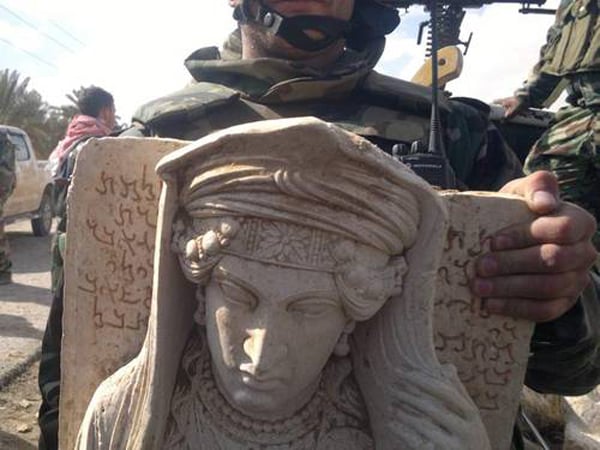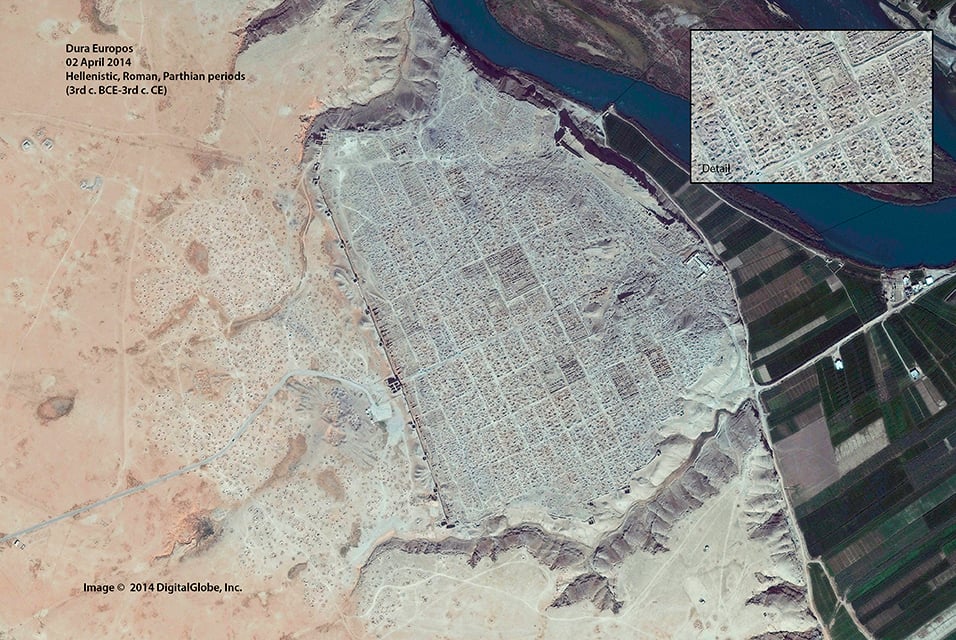Galleries
FBI Warns American Collectors Against Flood of New ISIS-Smuggled Antiquities
Provenance matters—especially here.

Provenance matters—especially here.

Sarah Cascone

The FBI is warning collectors that buying Iraqi and Syrian artifacts could help fund ISIS activities, as the militant group has been plundering important historic sites and selling stolen items on the black market.
“We now have credible reports that US persons have been offered cultural property that appears to have been removed from Syria and Iraq recently,” said Bonnie Magness-Gardiner, the FBI’s Art Theft Program manager, in a statement.
The announcement follows a May US Special Operations raid on an ISIS operative’s home, which recovered over 400 stolen artifacts, many from the National Museum of Iraq.
The FBI, however, is only the latest group to speak out against smuggling in the region, and the warning should come as no surprise to anyone in the market for Middle Eastern antiquities.

The temple of Bel sl, Dura-Europos, Syria. Photo: courtesy Wikimedia Commons.
The Syrian government, for instance, condemned neighboring Turkey this past March for turning a blind eye to the import of looted antiquities. Satellite imagery shows hundreds of illegal excavations at Dura-Europos, a 2,300-year-old city and archaeological site known as the “Pompeii of the Syrian desert,” and at other cultural properties in the region.
In October, UNESCO confirmed that ISIS was partially funding its activities through the sale of such stolen artifacts, the blood diamonds of the Middle East. The following month, US lawmakers proposed creating a cultural property protection czar position, that would look to preserve the world’s endangered cultural sites.
“This is the greatest scale of looting we have seen since the Second World War,” former Christie’s director Robert Jenrick told the Art Newspaper in January, as the UK looked to crack down on smuggling following the discovery of $58 million-worth of stolen Middle Eastern artifacts.
UNESCO’s United Nations Security Council Resolution 2199, passed in February, is attempting to place new legal measures in order to stop ISIS from funding itself through antiquities trafficking.
“Every person needs to know that the purchase of property from Iraq is punishable, but also that it supports and finances terrorist activities,” German state minister Maria Boehmer told the UN this May, during a General Assembly meeting.

Satellite imagery showing looting at Dura Europos, an archaeological site in Syria.
Photo: FBI.
In June, the International Council of Museums released an emergency red list of Iraqi cultural items threatened by terrorist activities, in an attempt to thwart trafficking. Syria has had an emergency red list since 2013.
Nevertheless, looted objects have been found in London antiques shops as recently as last month.
ISIS’s cultural destruction, particularly the brutal attack on sculptures at the Nineveh Museum in Mosul, Iraq, have been widely condemned. New York’s Metropolitan Museum of Art, US Secretary of State John Kerry, and the United Nations have also denounced such acts as war crimes.
The FBI’s ISIL Antiquities Trafficking document contains the following message:
Please be cautious when purchasing items from this region. Keep in mind that antiquities from Iraq remain subject to Office of Foreign Assets Control sanctions under the Iraq Stabilization and Insurgency Sanctions Regulations (31 CFR part 576).
Purchasing an object looted and/or sold by the Islamic State may provide financial support to a terrorist organization and could be prosecuted under 18 USC 233A.
Robust due diligence is necessary when purchasing any Syrian or Iraqi antiquities or other cultural property in the U.S. or when purchasing elsewhere using U.S. funds.
Art and antiquities dealers in the US are being asked to spread the FBI’s message in the hope of cutting off a lucrative income source for the jihadist group.
“Check and verify provenance, importation, and other documents,” Magness-Gardiner told the FBI. “What we’re trying to say is, don’t allow these pieces that could potentially support terrorism to be part of the trade.”
Related Articles:
ISIS Blows Up Palmyra’s Ancient Baal Shamin Temple, Fulfilling Dark Predictions
ISIS Beheads 82-Year Old Syrian Antiquities Expert Who Refused to Reveal Hidden Ancient Artifacts
Nine Arrests as ISIS Claims Credit for Bardo Museum Attack in Tunisia